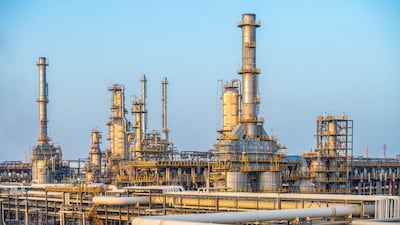Adnoc Refining, a joint venture company between Adnoc, Eni and OMV, expects to complete the first phase of its waste-heat recovery project in Ruwais by the end of this year as part of efforts to decarbonise operations.
Work on the $600 million project, located at the site of the general utilities plant in Ruwais, began in 2018.
The waste-heat recovery project will capture exhaust heat from the gas-powered turbines at the Ruwais plant — which is currently vented into the atmosphere — to produce steam that is subsequently used for power production.
The project will recycle waste heat to produce up to an additional 230 megawatts of electricity a day and 62,400 cubic metres of distilled water a day for use in the plant, Adnoc said.
Overall, the waste-heat recovery project will increase power production and thermal efficiency at the plant by about 30 per cent, with no additional carbon dioxide emissions.
Phase one, which includes the operation of two new boilers and turbines, will be completed before the end of the year. The second phase, which includes a further two boilers, will be completed around the middle of 2023, Adnoc said.
“The waste-heat recovery project will revolutionise power and water generation at our plant in Ruwais and is vital to the ongoing expansion of Ruwais as part of Adnoc’s 2030 smart growth strategy,” said Abdulla Al Messabi, chief executive of Adnoc Refining.
“We are committed to finding innovative ways to improve the efficiency and sustainability of our operations.”
Adnoc is currently working on reducing its greenhouse gas emissions intensity by 25 per cent by 2030, in line with the UAE Net Zero by 2050 strategic initiative.
As part of its strategy, the UAE, which will host the Cop28 climate summit in 2023, plans to invest Dh600 billion ($163.4bn) in clean and renewable energy sources over the next three decades.
Earlier this week, the country also set a more ambitious target of cutting carbon emissions by 31 per cent by 2030, instead of the 23.5 per cent reduction pledge the Emirates made in December 2020.
The waste-heat recovery project is one of Adnoc's strategic initiatives to decarbonise its operations. Others include the enforcement of a zero routine gas flaring policy and the establishment of the region’s first commercial-scale carbon capture and underground storage unit in 2016.
Adnoc also announced plans last October to meet up to 100 per cent of its power requirements from clean nuclear and solar energy sources through a partnership with the Emirates Water and Electricity Company.
It also plans to become the first oil and gas company in the world to completely decarbonise its electric grid at scale.
In December, Adnoc launched a $3.6bn renewable energy project in collaboration with the Abu Dhabi National Energy Company, better known as Taqa, to decarbonise its offshore production operations.


